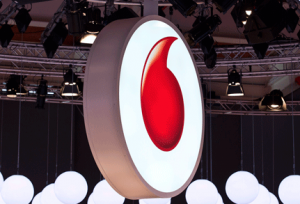
After more than 40 years of operation, DTVE is closing its doors and our website will no longer be updated daily. Thank you for all of your support.
Vodafone expecting ‘material’ hit from change in German TV law
 Changes to Germany law set to come into force at the end of the year, ending collective TV contracts with housing associations, will have “a material impact” on the company’s EBITDA, according to CEO Margaretha Della Valle.
Changes to Germany law set to come into force at the end of the year, ending collective TV contracts with housing associations, will have “a material impact” on the company’s EBITDA, according to CEO Margaretha Della Valle.
Vodafone’s overall subscriber numbers in Germany, its key market, meawhile are “likely to get worse before they get better” according to new CEO , answering analyst questions after Vodafone posted its full year results.
In a widely reported announcement, Della Valle also said Vodafone is to cut 11,000 staff from its workforce over the next three years, representing just over 10% of its total headcount, as she attempts to turn the troubled telecom giant’s fortunes around.
The cuts are likely to affect staff working in the UK, Germany and Italy.
In Germany, where the company is notably struggling, Vodafone’s TV base declined by 412,000 and its converged customer base decreased by 52,000 to 2.3 million converged accounts. The company said the declines primarily reflected higher disconnections of broadband bundle customers, as well as fewer cross-selling opportunities.
However, Vodafone faces tougher times ahead with changes to German TV laws at the end of this year that will end the practice of bulk TV contracting in housing association-run Multi Dwelling Units. Vodafone has about 8.5 million customers who could be affected by this change, delivering €800 million in revenue. The change requires the company to strike individual contracts with tenants.
On the housing association issue, Della Valle said a first trial of switching from collective to individual contract had shown a 65% retention rate of customers transitioning to individual billing, which she said more or less conformed to how many customers were actively using the service. However, she warned that a second trial was showing a much lower conversion rate and that the overall impact was unpredictable.
She said “some impacts will be visible” next year, with customer migration at scale to individual contracts from the end of the year. There may be significant fluctuations in customer numbers because of the lag between housing associations disconnecting and Vodafone individually reconnecting subscribers, she said.
Della Valle said the impact on EBITDA this year would be about €0.1 billion, but the main impact would be felt next year.
“This will be a material headwind in 2025,” she said.
As housing associations paid in advance, the change would also have an impact on working capital, she said.
Della Valle said that a “turnaround in Germany will be essential to our growth” and that the company had a lot of work to do to “restore our competitiveness”.
She said service revenues in Germany should see a step change in Q1 that should help fuel “reacceleration of growth within Europe”. However, she noted that subscriber numbers would get “worse before they get better”.
The CEO said that “execution in Germany has been consistently disappointing” and the company had been left behind particularly in the evolution of mobile packages.
She said some additional churn would be expected from price hikes but that the net impact would be a boost to service revenue.
Vodafone’s Spanish options
Vodafone will also review options for its struggling Spanish business.
Spain is Vodafone’s other big TV market, and the operator saw its TV base decline by 56,000 due to price competition and the ongoing closure of DSL. Its broadband base also fell by 121,000.
With a sale of the Spanish operation widely speculated on, Della Valle said every option would have to be “assessed on its merits” but noted that “both organic and inorganic change are a priority”.
Overall, Della Valle said that Vodafone’s performance relative to competitors had “not been good enough” and that the company needed to change.
She said the company had to focus on being “right sized”, indicating a potential withdrawal from some markets.
Individual markets in the future will be “fully autonomous” in how they make decisions about what is required to serve their customers, she said.
In TV overall, the telco had 20.7 million customers at the end of its fourth fiscal quarter in March, down from 21.9 million a year ago. It also lost mobile contract and fixed broadband customers in Europe over the same period, although the number of converged customers edged up by 100,000 to 9.1 million.
Overall full year group revenues stood at €45.7 billion, up 0.3%, while adjusted EBITDAaL was €14.7 billion.



